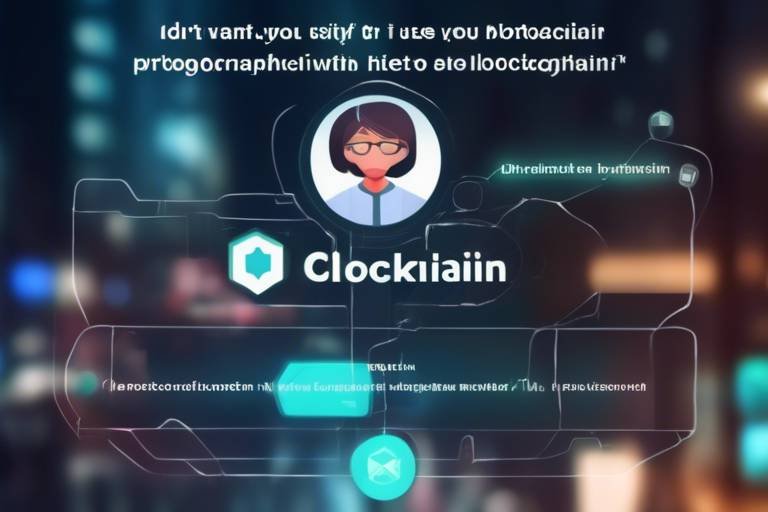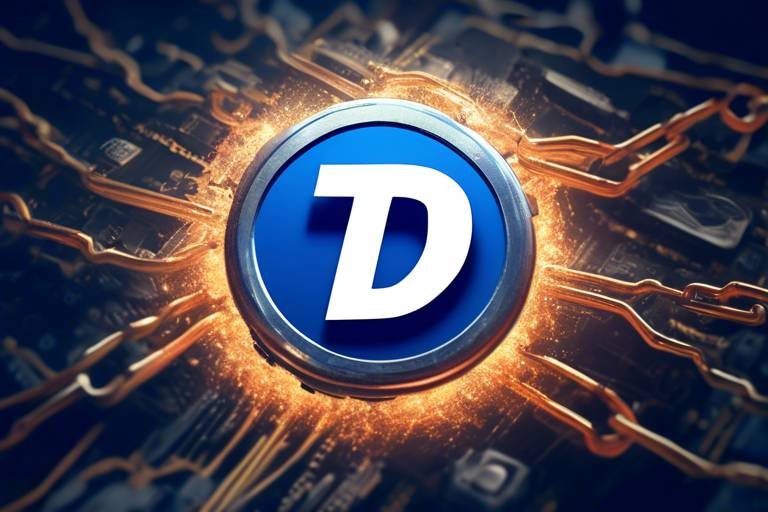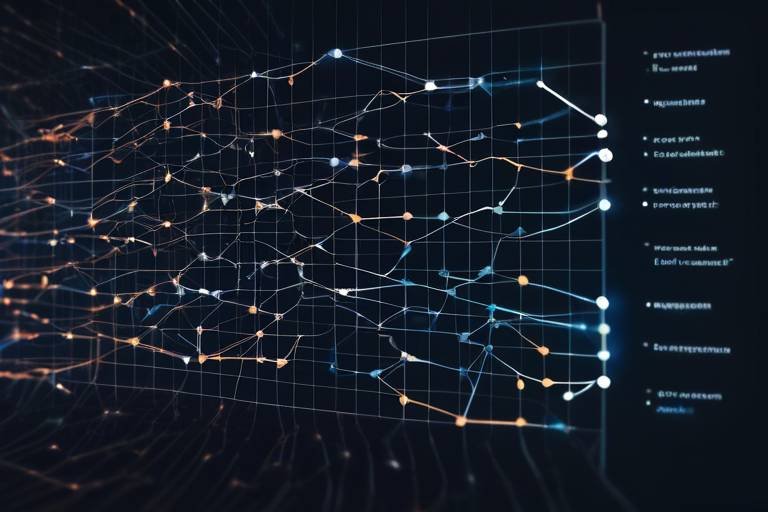Chainlink - The Importance of Oracles in Blockchain
In the rapidly evolving world of blockchain technology, one term that often comes up is oracles. But what exactly are they, and why are they so crucial? Well, imagine a world where smart contracts can seamlessly interact with real-world data. This is where Chainlink steps in, acting as a bridge that connects the blockchain to external information sources. In this article, we will explore the pivotal role of Chainlink and its oracles in enhancing the functionality and reliability of smart contracts.
Chainlink is not just any oracle network; it is a decentralized powerhouse that revolutionizes how smart contracts operate. Without oracles, smart contracts would be stuck in a vacuum, unable to access the data they need to execute complex agreements. Think of oracles as the messengers that deliver crucial information from the outside world to the blockchain. This capability opens up a plethora of possibilities, from financial transactions to insurance claims, enabling a range of applications that were previously unimaginable.
As we delve deeper into the significance of Chainlink, we will uncover how its architecture and components work together to provide a secure and reliable data feed. The decentralized nature of Chainlink is one of its standout features, ensuring that data is sourced from multiple independent oracles. This decentralization not only enhances the reliability of the information provided but also minimizes the risk of manipulation or single points of failure. In essence, Chainlink is the backbone that allows blockchain technology to interact with the real world, ensuring that smart contracts can operate effectively and securely.
Oracles serve as the vital link between blockchain networks and external data sources. They allow smart contracts to access off-chain information, which is essential for executing contracts that depend on real-world events. There are several types of oracles, including:
- Software Oracles: These connect smart contracts to online data sources, such as APIs or websites.
- Hardware Oracles: These interact with physical devices, allowing smart contracts to receive data from the real world.
- Inbound Oracles: These bring data from outside the blockchain into the smart contract.
- Outbound Oracles: These send information from the smart contract to external systems.
Understanding the different types of oracles is crucial to grasping how Chainlink operates. Each type serves a specific purpose and enhances the capabilities of smart contracts in unique ways. As we continue to explore Chainlink, keep in mind that the integration of oracles is what truly unlocks the potential of blockchain technology.
Chainlink is a decentralized oracle network that connects smart contracts with real-world data. Its architecture consists of multiple components, including the Chainlink Core, which is responsible for managing and coordinating the network of oracles, and the Chainlink Nodes, which fetch and verify data from various sources. By utilizing a decentralized network of nodes, Chainlink ensures that data is sourced from multiple independent oracles, significantly enhancing the reliability of the information provided.
The decentralization of data sources is a key feature of Chainlink. By sourcing data from multiple independent oracles, Chainlink mitigates the risks associated with relying on a single data source. This approach not only reduces the potential for data manipulation but also enhances the overall reliability of the information provided to smart contracts. In a world where trust is paramount, this decentralization fosters confidence in the data being used.
The benefits of decentralization are manifold:
- Increased Security: By distributing data sources, Chainlink minimizes the risk of a single point of failure.
- Reduced Manipulation Risks: With multiple oracles providing data, the chances of any one oracle manipulating the information are significantly lower.
- Improved Trustworthiness: Decentralization enhances the overall integrity of smart contracts, making them more reliable.
However, it's important to note that decentralization is not without its challenges. Coordinating among various oracles can be complex, and there may be potential latency issues in data delivery. These challenges can impact the speed and efficiency of smart contracts, which is a crucial consideration for developers and users alike.
Chainlink's oracles have found applications across various industries, including finance, insurance, and gaming. For instance, in the financial sector, Chainlink can provide real-time market data to facilitate automated trading. In insurance, it can verify external conditions like weather data to trigger payouts automatically. These use cases highlight the practical applications and benefits of Chainlink's technology, showcasing how it enhances the efficiency and reliability of smart contracts.
As with any technology, security is paramount in blockchain applications. Chainlink employs a variety of security measures to protect data integrity and prevent malicious attacks on its oracle network. This includes robust data validation mechanisms, which ensure that the information provided to smart contracts is accurate and reliable.
Chainlink utilizes several techniques for data validation, including consensus mechanisms among oracles to verify the accuracy of the information before it is relayed to smart contracts. This process is akin to a jury deliberating to reach a verdict, ensuring that only the most reliable data is accepted.
Despite its comprehensive security measures, Chainlink is not immune to risks and threats. Potential vulnerabilities include oracle manipulation and data spoofing. To mitigate these risks, Chainlink continuously monitors its network and implements strategies to enhance security, ensuring that smart contracts can rely on the data they receive without fear of tampering.
What is an oracle in blockchain?
An oracle is a third-party service that provides smart contracts with external data, allowing them to interact with real-world information.
How does Chainlink ensure data reliability?
Chainlink sources data from multiple independent oracles, employs consensus mechanisms, and utilizes robust data validation techniques to ensure reliability.
What are the benefits of using Chainlink?
Chainlink enhances the functionality of smart contracts by providing access to real-world data, ensuring security through decentralization, and improving trustworthiness.
Are there any challenges associated with Chainlink?
Yes, challenges include coordination among oracles and potential latency issues, which can affect the speed and efficiency of data delivery.

Understanding Oracles
In the ever-evolving world of blockchain technology, oracles play a pivotal role as the unsung heroes that bridge the gap between the blockchain and the outside world. Imagine oracles as the messengers in a kingdom, tasked with bringing crucial news from distant lands to the king—without them, the king (or in this case, the smart contract) would remain oblivious to important happenings outside his castle walls. Oracles serve as vital conduits, enabling smart contracts to access off-chain data, which is essential for executing complex agreements that require real-world information.
There are several types of oracles, each with its unique functions and characteristics. Generally, oracles can be categorized into three main types: software oracles, hardware oracles, and contract oracles. Software oracles fetch data from online sources, such as APIs or websites, while hardware oracles gather information from the physical world, like sensors or IoT devices. Contract oracles, on the other hand, facilitate communication between different smart contracts on various blockchain networks. This diversity allows smart contracts to be versatile and responsive, adapting to a wide range of scenarios.
To illustrate the importance of oracles, consider a smart contract that governs a decentralized insurance policy. This contract needs to access real-time weather data to determine if a payout is warranted due to a natural disaster. Without an oracle, the smart contract would be unable to retrieve this external data, rendering it ineffective. By utilizing an oracle, the contract can automatically receive the necessary information and execute its terms seamlessly, showcasing the essential role oracles play in enhancing the functionality of blockchain applications.
Moreover, the reliability of oracles is crucial for the integrity of smart contracts. If an oracle provides inaccurate or manipulated data, it can lead to disastrous consequences, such as financial losses or contractual disputes. Therefore, understanding the different types of oracles and their mechanisms is vital for anyone looking to leverage blockchain technology effectively. As we dive deeper into the world of Chainlink, we will explore how this decentralized oracle network addresses these challenges and enhances the capabilities of smart contracts.

Chainlink Overview
Chainlink is not just any ordinary oracle network; it’s a decentralized powerhouse that acts as a vital link between smart contracts and real-world data. Imagine a world where contracts can automatically execute based on real-time information—this is the magic that Chainlink brings to the table. By facilitating the connection between on-chain and off-chain data, Chainlink significantly enhances the capabilities of blockchain applications, making them more versatile and reliable.
At its core, Chainlink comprises several key components that work in harmony to create a robust ecosystem. These include decentralized oracles, which gather data from various sources, and a network of node operators who validate and transmit this information to the blockchain. This architecture not only increases the volume of data accessible to smart contracts but also ensures that the data is trustworthy and accurate. Think of it like a relay race—each runner (or node) plays a critical role in passing the baton (or data) to the next, ensuring that the information reaches its destination without any hiccups.
One of the standout features of Chainlink is its decentralization. Unlike traditional oracles that rely on a single source of information, Chainlink aggregates data from multiple independent oracles. This approach minimizes the risk of single points of failure and enhances the overall reliability of the data being fed into smart contracts. When you have diverse sources contributing to the same outcome, it's like having multiple witnesses to an event—this collective verification adds a layer of trust that is essential in the world of blockchain.
Moreover, Chainlink's architecture allows for the creation of customizable oracles, which can be tailored to meet the specific needs of various applications. This flexibility means that developers can design oracles that pull data from specific APIs, ensuring that the information is not only relevant but also timely. In a world where data is constantly evolving, this adaptability is crucial for maintaining the integrity and functionality of smart contracts.
It’s important to highlight that Chainlink doesn’t just stop at connecting smart contracts to data; it also enables cross-chain interactions. This means that smart contracts on one blockchain can communicate with data from another, breaking down barriers and fostering a more interconnected blockchain ecosystem. Imagine the possibilities when different blockchain networks can share data seamlessly—this is the future that Chainlink is paving the way for.
In summary, Chainlink is a game-changer in the blockchain space, offering a decentralized oracle network that enhances the functionality and reliability of smart contracts. With its robust architecture, emphasis on decentralization, and ability to facilitate cross-chain interactions, Chainlink is not just a tool; it’s a crucial component of the blockchain revolution.
- What is Chainlink? - Chainlink is a decentralized oracle network that connects smart contracts with real-world data.
- How does Chainlink ensure data reliability? - Chainlink aggregates data from multiple independent oracles, minimizing the risk of single points of failure.
- Can Chainlink facilitate cross-chain interactions? - Yes, Chainlink enables smart contracts on different blockchains to communicate with each other through its oracles.
- What are the benefits of using Chainlink? - Enhanced data reliability, increased security, and the ability to access real-time information from various sources.

Decentralization of Data Sources
In the ever-evolving landscape of blockchain technology, decentralization stands as a foundational pillar, especially when it comes to the functionality of oracles. Chainlink's unique architecture leverages multiple independent oracles to gather and verify data, creating a robust network that minimizes the risks associated with relying on a single source. You can think of it as a team of experts rather than just one individual; when multiple voices contribute, the outcome is more reliable and trustworthy.
Imagine you’re trying to predict the weather for an outdoor event. If you only check one weather app, your forecast could be skewed by inaccuracies. However, if you consult several sources—like different weather services—you get a more accurate picture. This analogy highlights how Chainlink's decentralization works to ensure that smart contracts receive the most accurate and reliable data possible. By sourcing information from various independent oracles, Chainlink effectively reduces the chances of single points of failure that could compromise the integrity of the data.
Moreover, the decentralization of data sources also fosters a competitive environment among oracles, which can lead to better performance and reliability. Each oracle is incentivized to provide accurate data to maintain its reputation and reliability within the network. This competitive dynamic not only enhances the quality of data but also encourages oracles to adopt best practices in data sourcing and validation.
However, it’s important to note that while decentralization brings numerous advantages, it also introduces complexities. Coordinating between multiple oracles can sometimes lead to challenges, such as inconsistencies in data reporting or delays in data delivery. To illustrate this, consider the following table that summarizes the pros and cons of decentralization in Chainlink:
| Advantages | Disadvantages |
|---|---|
| Increased security through multiple data sources | Complexity in coordination among oracles |
| Reduced risk of manipulation and fraud | Potential latency issues in data delivery |
| Enhanced trustworthiness of smart contracts | Higher operational costs due to multiple sources |
In conclusion, the within Chainlink not only enhances the reliability of the information fed into smart contracts but also strengthens the entire blockchain ecosystem. While there are challenges to navigate, the benefits of having multiple independent oracles far outweigh the drawbacks. As we continue to explore the capabilities of Chainlink, it becomes increasingly clear that decentralization is not just a feature; it is a necessity for the future of secure and efficient blockchain applications.

Benefits of Decentralization
Decentralization is not just a buzzword in the blockchain world; it's a fundamental principle that brings a multitude of benefits to the table. When we talk about Chainlink and its decentralized oracle network, we’re really diving into a system that prioritizes security, trustworthiness, and reliability. So, what exactly does decentralization mean for Chainlink and its users? Let’s break it down.
First and foremost, decentralization significantly increases security. By sourcing data from multiple independent oracles, Chainlink minimizes the risk of data manipulation. Imagine a single oracle as a lone soldier guarding a fortress; if that soldier falls, the entire fortress is compromised. However, if you have a battalion of soldiers (or oracles) watching over the fortress, the chances of a successful breach decrease dramatically. This is the essence of decentralization—it creates a network of checks and balances that bolster security.
Moreover, decentralization fosters trust. In a world where data integrity is paramount, users need to feel confident that the information they receive is accurate and reliable. By utilizing various oracles, Chainlink ensures that the data is not solely dependent on one source, thereby enhancing its credibility. This multi-source approach acts like a safety net, catching discrepancies and ensuring that only the most reliable data reaches the smart contracts.
Another significant advantage is the reduction of manipulation risks. When data is aggregated from a plethora of oracles, the likelihood of any single entity influencing the outcome diminishes. This is crucial in scenarios where financial transactions or critical decisions hinge on accurate data. For instance, in the world of insurance, if a smart contract relies on weather data to determine payouts, having multiple oracles reporting on the same event ensures that no single party can skew the results for their benefit.
Decentralization also enhances resilience. In a traditional centralized system, if one node fails, the entire network could be at risk. However, in a decentralized model, the failure of one oracle does not spell doom for the entire system. Instead, the remaining oracles can continue to provide data, ensuring that the smart contracts function seamlessly. This resilience is akin to a well-built bridge where multiple supports can bear the load; if one support weakens, others can step in to maintain stability.
In summary, the benefits of decentralization in Chainlink's oracle network are profound. From increased security and trustworthiness to reduced manipulation risks and enhanced resilience, decentralization plays a pivotal role in ensuring that smart contracts operate effectively and reliably. As we continue to explore the potential of blockchain technology, understanding these benefits will be crucial for developers and users alike.
- What is Chainlink? Chainlink is a decentralized oracle network that connects smart contracts with real-world data.
- How does decentralization enhance security? By utilizing multiple independent oracles, decentralization reduces the risk of data manipulation and single points of failure.
- What are the real-world applications of Chainlink? Chainlink's oracles are used in various industries, including finance, insurance, and gaming, to provide reliable data feeds for smart contracts.
- What challenges does decentralization face? Decentralization can lead to coordination challenges among oracles and potential latency issues in data delivery.

Challenges of Decentralization
While decentralization is often celebrated as a hallmark of blockchain technology, it comes with its own set of challenges that can complicate the functionality of oracles like Chainlink. One of the primary issues is the coordination among multiple oracles. When data is sourced from various independent oracles, ensuring that they all provide consistent and accurate information can be a daunting task. Imagine trying to organize a group of friends to decide on a restaurant; without effective communication, you might end up with conflicting choices and a lot of confusion. Similarly, if oracles fail to synchronize their data, smart contracts may receive conflicting information, leading to potential errors in execution.
Another challenge is related to latency issues. Since decentralized oracles pull data from different sources, the time it takes for each oracle to retrieve and deliver data can vary significantly. This inconsistency can lead to delays in the processing of smart contracts, which, in time-sensitive applications like finance or insurance, could result in lost opportunities or financial losses. For instance, if a smart contract needs to execute a trade based on real-time market data, any delay can mean the difference between profit and loss.
Moreover, the sheer volume of data and the number of oracles involved can create complexity in data aggregation. When multiple oracles report their findings, the system must have a robust mechanism to evaluate and decide which data points to trust. This is akin to sifting through a mountain of information to find the most reliable source; the more sources you have, the harder it can be to determine which is accurate. The aggregation process must be efficient to avoid bottlenecks that could hinder the overall system's performance.
Lastly, there is the potential for discrepancies in data quality. Not all oracles are created equal; some may have higher standards for data collection and validation than others. This disparity can lead to situations where the data provided by one oracle is far more reliable than that of another. In a decentralized network, ensuring that all oracles meet a certain quality standard is essential but can be quite challenging. A comprehensive quality assurance process is necessary to mitigate these risks and ensure that the data used by smart contracts is trustworthy.
In summary, while decentralization enhances the reliability and security of data in blockchain applications, it also introduces complexities that need to be managed effectively. The challenges of coordination, latency, data aggregation, and quality discrepancies must be addressed to fully leverage the benefits of decentralized oracles like Chainlink.
- What are oracles in blockchain technology? Oracles are third-party services that provide smart contracts with external data, allowing them to interact with the real world.
- Why is decentralization important for oracles? Decentralization minimizes the risk of data manipulation and single points of failure, enhancing the overall trustworthiness of the data provided to smart contracts.
- What challenges do decentralized oracles face? Challenges include coordination among multiple oracles, latency issues, data aggregation complexity, and discrepancies in data quality.
- How does Chainlink ensure data reliability? Chainlink employs various data validation mechanisms and aggregates data from multiple independent oracles to ensure accuracy and reliability.

Real-World Use Cases
Chainlink's innovative oracle technology has found its way into a variety of industries, showcasing its versatility and the crucial role it plays in bridging the gap between blockchain networks and real-world data. Imagine a world where smart contracts can automatically execute transactions based on real-time information—this is the promise of Chainlink. Let's explore some of the most exciting real-world use cases that highlight how Chainlink is revolutionizing different sectors.
One of the most prominent applications of Chainlink oracles is in the finance sector. Decentralized finance (DeFi) platforms rely heavily on accurate price feeds to execute trades and manage collateral. For instance, Chainlink provides reliable price data to platforms like Aave and Synthetix, enabling them to offer secure lending and synthetic asset trading. By utilizing multiple independent oracles, these platforms can minimize risks associated with price manipulation, ensuring that users can trade with confidence.
In the insurance industry, Chainlink is making waves by facilitating parametric insurance products. These are insurance contracts that automatically trigger payouts based on predefined conditions, such as weather events. For example, a crop insurance policy could automatically compensate farmers if rainfall falls below a certain threshold, with Chainlink oracles providing the necessary weather data. This not only streamlines the claims process but also enhances transparency and trust between insurers and policyholders.
The gaming industry is another area where Chainlink's oracles are proving invaluable. Developers can integrate real-world data into their games to create dynamic experiences. For example, a game could adjust its in-game economy based on real-time cryptocurrency prices, providing players with a unique and engaging experience. Additionally, Chainlink's oracles can ensure fairness in gaming outcomes by providing verifiable randomness, which is crucial for games that rely on chance.
Furthermore, Chainlink's oracles are being utilized in supply chain management to enhance transparency and traceability. By connecting blockchain networks with real-world data, businesses can track the movement of goods in real-time. For instance, a food supply chain could use Chainlink to verify the temperature conditions of perishable goods during transit, ensuring that they meet safety standards. This level of transparency not only protects consumers but also strengthens brand trust.
To summarize, the real-world applications of Chainlink's oracle technology are vast and varied. From finance and insurance to gaming and supply chain management, Chainlink is paving the way for more reliable, efficient, and transparent interactions between smart contracts and real-world data. The potential is limitless, and as more industries recognize the power of oracles, we can expect to see even more innovative use cases emerge.
- What is Chainlink? Chainlink is a decentralized oracle network that connects smart contracts with real-world data, enhancing the functionality of blockchain applications.
- How do oracles work? Oracles serve as intermediaries that fetch and verify external data before sending it to smart contracts on the blockchain.
- Why is decentralization important for oracles? Decentralization reduces the risk of single points of failure and enhances the reliability of the data provided to smart contracts.
- What industries are using Chainlink? Chainlink is being utilized in various industries, including finance, insurance, gaming, and supply chain management.
- What are the security measures in place for Chainlink? Chainlink employs robust data validation mechanisms and decentralization strategies to ensure data integrity and prevent malicious attacks.

Security Considerations
When it comes to blockchain technology, security is not just an option; it's a necessity. Chainlink, as a decentralized oracle network, plays a crucial role in ensuring that smart contracts can interact with real-world data in a secure manner. The very essence of blockchain lies in its trustless nature, and Chainlink amplifies this by providing reliable data feeds that are immune to tampering. However, the path to achieving robust security is layered with challenges that need to be addressed systematically.
One of the fundamental aspects of Chainlink's security framework is its multi-layered approach. By utilizing multiple independent oracles, Chainlink mitigates the risk of a single point of failure. This means that even if one oracle is compromised, the overall integrity of the data remains intact. Think of it like a safety net made of many threads; if one thread snaps, the rest hold firm. This decentralization is not just a buzzword; it’s a core principle that enhances the trustworthiness of the data being processed.
To further bolster security, Chainlink employs various data validation mechanisms. These mechanisms ensure that the data fed into smart contracts is accurate and reliable. For instance, Chainlink uses a consensus model where multiple oracles provide the same data, and only when a majority agrees is that data considered valid. This is akin to taking a poll; if most people agree on a fact, it’s likely true. Such validation techniques are critical in preventing malicious attacks that could compromise the entire network.
However, it's not all sunshine and rainbows. Despite these robust security measures, Chainlink is not entirely free from risks. Potential threats like oracle manipulation and data spoofing loom large. In the wrong hands, these vulnerabilities could lead to catastrophic results, such as financial losses or compromised contracts. To counter these threats, Chainlink has implemented several strategies, including regular audits, incentivizing honest behavior among oracle operators, and employing cryptographic techniques to secure data transmission.
Moreover, the community-driven nature of Chainlink enhances its security posture. By fostering a community of developers and users who actively contribute to the network, Chainlink benefits from a diverse set of perspectives and expertise. This collaborative environment encourages continuous improvement and rapid identification of potential vulnerabilities, making it harder for malicious actors to exploit weaknesses.
In conclusion, the security considerations surrounding Chainlink are multi-faceted and complex. While the decentralized nature of the network significantly enhances its reliability, ongoing vigilance and proactive measures are essential to safeguard against emerging threats. As the blockchain landscape evolves, so too must the strategies employed to protect it. Chainlink stands at the forefront of this evolution, continually adapting and improving to ensure that smart contracts can operate securely and efficiently.
- What is Chainlink? Chainlink is a decentralized oracle network that connects smart contracts with real-world data, enhancing their functionality and reliability.
- How does Chainlink ensure data security? Chainlink employs a multi-layered security approach, including data validation mechanisms and decentralized data sourcing to prevent manipulation and ensure reliability.
- What are the risks associated with Chainlink? Risks include oracle manipulation and data spoofing, but Chainlink mitigates these through regular audits and community involvement.
- Why is decentralization important for Chainlink? Decentralization reduces single points of failure, thereby enhancing the overall reliability and trustworthiness of the data fed into smart contracts.

Data Validation Mechanisms
In the world of blockchain, where trust and accuracy are paramount, Chainlink employs a variety of data validation mechanisms to ensure that the information fed into smart contracts is both reliable and precise. Think of it as a rigorous vetting process, similar to how a journalist verifies sources before publishing a story. This process is crucial because the success of smart contracts heavily relies on the quality of the data they receive. If the data is flawed or manipulated, the entire contract could fail, leading to significant financial repercussions.
One of the primary methods Chainlink uses for data validation is through a system of aggregated data sourcing. This means that instead of relying on a single oracle to provide information, Chainlink collects data from multiple independent oracles. By doing so, it creates a consensus mechanism where the data is cross-referenced. Imagine asking several friends for directions to a new restaurant; if most of them point you in the same direction, you can be more confident in your choice. This aggregation not only improves accuracy but also mitigates the risks associated with relying on a single point of failure.
Moreover, Chainlink utilizes reputation systems for oracles. Each oracle's performance is monitored and evaluated based on their historical accuracy and reliability. If an oracle consistently provides accurate data, its reputation improves, making it more likely to be selected for future tasks. Conversely, if an oracle is found to be providing inaccurate information, it can be penalized or removed from the network. This dynamic creates a self-regulating ecosystem where oracles are incentivized to maintain high standards of performance.
Additionally, Chainlink implements cryptographic proofs to validate data integrity. These proofs act as a digital fingerprint, ensuring that the data has not been tampered with during transmission. By using advanced cryptographic techniques, Chainlink can provide assurances that the data delivered to smart contracts is exactly what was intended, free from any malicious alterations. This level of security is essential in maintaining the trust necessary for blockchain applications.
To summarize, the data validation mechanisms employed by Chainlink can be illustrated in the following table:
| Validation Mechanism | Description |
|---|---|
| Aggregated Data Sourcing | Collects data from multiple oracles to ensure accuracy through consensus. |
| Reputation Systems | Evaluates oracle performance based on historical accuracy, incentivizing reliability. |
| Cryptographic Proofs | Ensures data integrity by providing a secure way to verify that data has not been altered. |
These mechanisms work in concert to create a robust framework that not only enhances the reliability of data fed into smart contracts but also builds trust among users and developers alike. In a landscape where the stakes are high, Chainlink's commitment to data validation is not just a technical necessity; it is a fundamental pillar that supports the entire ecosystem of decentralized applications.
- What are oracles in blockchain? Oracles are third-party services that provide smart contracts with external data, allowing them to interact with real-world information.
- How does Chainlink ensure data accuracy? Chainlink uses multiple validation mechanisms, including aggregated data sourcing, reputation systems, and cryptographic proofs to ensure data integrity.
- Why is decentralization important for oracles? Decentralization reduces the risk of single points of failure and manipulation, enhancing the overall reliability of the data provided to smart contracts.
- What industries are using Chainlink's technology? Chainlink's oracles have been implemented across various sectors, including finance, insurance, and gaming, showcasing its versatility and effectiveness.

Risks and Threats
Despite the robust security measures that Chainlink employs, the oracle network is not without its risks and threats. One of the primary concerns is oracle manipulation, where malicious actors may attempt to tamper with the data being fed into the smart contracts. This can lead to incorrect outcomes, potentially costing users significant amounts of money. Imagine a scenario where a financial contract relies on the price of a cryptocurrency, and an attacker manages to provide false price data. The implications could be disastrous, leading to erroneous trades or financial losses.
Another critical threat is data spoofing, where attackers create fake data feeds that appear legitimate. In a decentralized system like Chainlink, if an oracle is compromised, it could serve as a source of false information for multiple contracts. This is akin to a trusted friend giving you bad advice; if you rely on that information, you may find yourself in a precarious situation. To mitigate these risks, Chainlink employs various strategies, including the use of multiple data sources and consensus mechanisms that require agreement among several oracles before data is accepted.
Furthermore, the coordination among oracles presents its own set of challenges. As the network grows, ensuring that all oracles are synchronized and providing accurate data can become increasingly complex. This can lead to latency issues, where there is a delay in data delivery, potentially impacting the performance of smart contracts that rely on timely information. To counteract these challenges, Chainlink utilizes a decentralized approach, allowing for redundancy and backup systems to ensure that data is delivered promptly and accurately.
In summary, while Chainlink offers a powerful solution for connecting smart contracts with real-world data, it is essential to remain vigilant about the potential risks and threats. By understanding these challenges, developers and users can take proactive measures to safeguard their applications and ensure the integrity of their data.
- What is an oracle in blockchain?
An oracle is a service that connects smart contracts with external data sources, allowing them to access real-world information. - How does Chainlink enhance smart contracts?
Chainlink provides decentralized oracles that enable smart contracts to interact with off-chain data, improving their functionality and reliability. - What are the main risks associated with Chainlink?
The primary risks include oracle manipulation, data spoofing, and coordination challenges among oracles. - How does Chainlink mitigate security risks?
Chainlink employs various security measures, such as using multiple independent oracles and consensus mechanisms to validate data before it is used in smart contracts.
Frequently Asked Questions
- What are oracles in blockchain technology?
Oracles are essential components in blockchain technology that act as bridges between blockchain networks and external data sources. They enable smart contracts to access off-chain information, allowing them to interact with real-world data and execute automatically based on that information.
- How does Chainlink enhance the functionality of smart contracts?
Chainlink enhances the functionality of smart contracts by providing a decentralized oracle network that connects them with real-world data. This ensures that smart contracts can access accurate and reliable information, broadening their application across various industries such as finance, insurance, and gaming.
- What are the benefits of using decentralized oracles?
Decentralized oracles offer several benefits, including increased security, reduced risks of data manipulation, and improved trustworthiness of the information provided. By sourcing data from multiple independent oracles, Chainlink minimizes the risk of single points of failure, enhancing the overall integrity of smart contracts.
- What challenges do decentralized oracles face?
While decentralization provides many advantages, it also presents challenges such as the need for coordination among various oracles and potential latency issues in data delivery. These challenges can impact the speed and efficiency with which data is provided to smart contracts.
- Can you provide examples of real-world use cases for Chainlink?
Chainlink's oracles have been successfully implemented in various sectors, including finance for secure transactions, insurance for automated claim processing, and gaming for fair play mechanisms. These use cases demonstrate the practical applications and benefits of Chainlink's technology in enhancing operational efficiency.
- What security measures does Chainlink have in place?
Chainlink employs robust security measures to protect data integrity, including data validation mechanisms that ensure the accuracy and reliability of information provided to smart contracts. These measures help safeguard against malicious attacks and ensure that the data used in smart contracts is trustworthy.
- What risks are associated with using Chainlink?
Despite its security protocols, Chainlink faces potential risks such as oracle manipulation and data spoofing. These threats can compromise the integrity of the data used in smart contracts. However, strategies are in place to mitigate these risks and maintain the reliability of the oracle network.



















